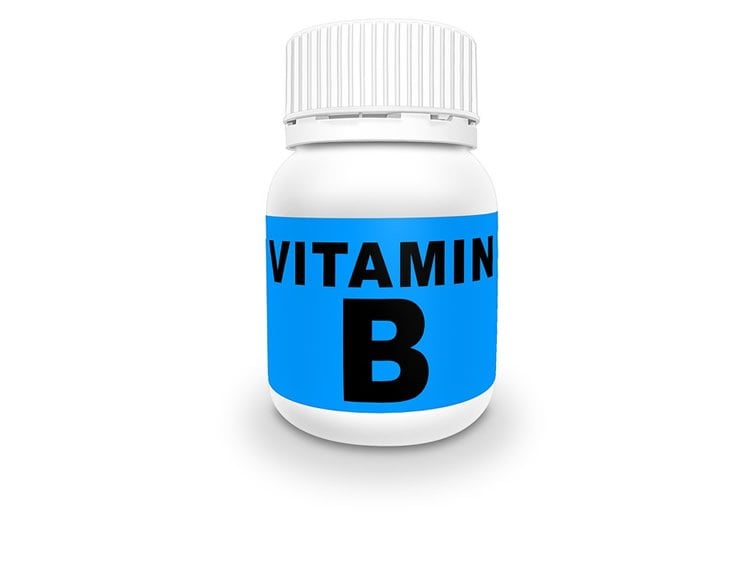Summary: Accoring to a new study, high doses of certain B vitamins could help to reduce some of the symptoms of schizophrenia when coupled with antipsychotic treatments.
Source: University of Manchester.
A review of worldwide studies has found that add-on treatment with high-dose b-vitamins – including B6, B8 and B12 – can significantly reduce symptoms of schizophrenia more than standard treatments alone.
The research – on the effect of vitamin and mineral supplements on symptoms of schizophrenia – is funded by The Medical Research Council and University of Manchester, and is published in Psychological Medicine.
Lead author Joseph Firth, based at the University’s Division of Psychology and Mental Health, said: “Looking at all of the data from clinical trials of vitamin and mineral supplements for schizophrenia to date, we can see that B vitamins effectively improve outcomes for some patients.
“This could be an important advance, given that new treatments for this condition are so desperately needed.”
Schizophrenia affects around 1% of the population and is among the most disabling and costly long term conditions worldwide.
Currently, treatment is based around the administration of antipsychotic drugs.
Although patients typically experience remission of symptoms such as hallucinations and delusions within the first few months of treatment, long-term outcomes are poor; 80% of patients relapse within five years.
The researchers reviewed all randomized clinical trials reporting effects of vitamin or mineral supplements on psychiatric symptoms in people with schizophrenia.
In what is the first meta-analysis carried out on this topic, they identified 18 clinical trials with a combined total of 832 patients receiving antipsychotic treatment for schizophrenia.
B-vitamin interventions which used higher dosages or combined several vitamins were consistently effective for reducing psychiatric symptoms, whereas those which used lower doses were ineffective.
Also, the available evidence also suggests that B-vitamin supplements may be most beneficial when implemented early on, as b-vitamins were most likely to reduce symptoms when used in studies of patients with shorter illness durations.

Firth added: “High-dose B-vitamins may be useful for reducing residual symptoms in people with schizophrenia, although there were significant differences among the findings of the studies we looked at.”
“There is also some indication that these overall effects may be driven by larger benefits among subgroups of patients who have relevant genetic or dietary nutritional deficiencies.”
Co-author Jerome Sarris, Professor of Integrative Mental Health at Western Sydney University, added: “This builds on existing evidence of other food-derived supplements, such as certain amino-acids, been beneficial for people with schizophrenia.
“These new findings also fit with our latest research examining how multi-nutrient treatments can reduce depression and other disorders.”
The research team say more studies are now needed to discover how nutrients act on the brain to improve mental health, and to measure effects of nutrient-based treatments on other outcomes such as brain functioning and metabolic health.
Funding: The Medical Research Council funded this study.
Source: Jamie Brown – University of Manchester
Image Source: NeuroscienceNews.com image is in the public domain.
Original Research: Abstract for “The effects of vitamin and mineral supplementation on symptoms of schizophrenia: a systematic review and meta-analysis” by J. Firth, B. Stubbs, J. Sarris, S. Rosenbaum, S. Teasdale, M. Berk, and A. R. Yung in Psychological Medicine. Published online February 16 2017 doi:10.1017/S0033291717000022
[cbtabs][cbtab title=”MLA”]University of Manchester “B Vitamins May Reduce Schizophrenia Symptoms.” NeuroscienceNews. NeuroscienceNews, 16 February 2017.
<https://neurosciencenews.com/b-vitamins-schizophrenia-6124/>.[/cbtab][cbtab title=”APA”]University of Manchester (2017, February 16). B Vitamins May Reduce Schizophrenia Symptoms. NeuroscienceNew. Retrieved February 16, 2017 from https://neurosciencenews.com/b-vitamins-schizophrenia-6124/[/cbtab][cbtab title=”Chicago”]University of Manchester “B Vitamins May Reduce Schizophrenia Symptoms.” https://neurosciencenews.com/b-vitamins-schizophrenia-6124/ (accessed February 16, 2017).[/cbtab][/cbtabs]
Abstract
The effects of vitamin and mineral supplementation on symptoms of schizophrenia: a systematic review and meta-analysis
When used as an adjunctive with antipsychotics, certain vitamins and minerals may be effective for improving symptomatic outcomes of schizophrenia, by restoring nutritional deficits, reducing oxidative stress, or modulating neurological pathways.
We conducted a systematic review of all randomized controlled trials (RCTs) reporting effects of vitamin and/or mineral supplements on psychiatric symptoms in people with schizophrenia. Random-effects meta-analyses were used to calculate the standardized mean difference between nutrient and placebo treatments.
An electronic database search in July 2016 identified 18 eligible RCTs, with outcome data for 832 patients. Pooled effects showed that vitamin B supplementation (including B6, B8 and B12) reduced psychiatric symptoms significantly more than control conditions [g = 0.508, 95% confidence interval (CI) 0.01–1.01, p = 0.047, I2 = 72.3%]. Similar effects were observed among vitamin B RCTs which used intention-to-treat analyses (g = 0.734, 95% CI 0.00–1.49, p = 0.051). However, no effects of B vitamins were observed in individual domains of positive and negative symptoms (both p > 0.1). Meta-regression analyses showed that shorter illness duration was associated with greater vitamin B effectiveness (p = 0.001). There were no overall effects from antioxidant vitamins, inositol or dietary minerals on psychiatric symptoms.
There is preliminary evidence that certain vitamin and mineral supplements may reduce psychiatric symptoms in some people with schizophrenia. Further research is needed to examine how the benefits of supplementation relate to nutrient deficits and the impact upon underlying neurobiological pathways, in order to establish optimal nutrient formulations for improving clinical outcomes in this population. Future studies should also explore the effects of combining beneficial nutrients within multi-nutrient formulas.
“The effects of vitamin and mineral supplementation on symptoms of schizophrenia: a systematic review and meta-analysis” by J. Firth, B. Stubbs, J. Sarris, S. Rosenbaum, S. Teasdale, M. Berk, and A. R. Yung in Psychological Medicine. Published online February 16 2017 doi:10.1017/S0033291717000022






